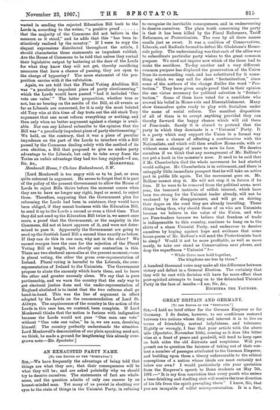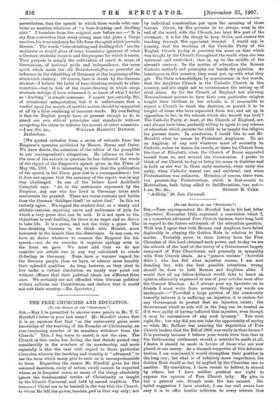GREAT BRITAIN AND GERMANY.
[To THE EDITOR Of TEl "SPECTATOR"] hold no brief either for the German Emperor or for Germany. I do desire, however, to see confidence restored between two nations whose duty and interest it is to live on terms of friendship, mutual helpfulness, and tolerance. Rightly or wrongly, I fear that your article with the above title (Spectator, November 16th), coming as it does like bitter wine at a feast of peace and goodwill, will tend to keep open on both sides the old distrusts and suspicions. Will you permit me to question the fairness of taking out of their con- text a number of passages attributed to the German Emperor, and building upon them a theory unfavourable to the ethical conceptions of a nation whose ideals are most certainly not below our own ? I would particularly cite your quotation from the Emperor's speech to Bonn students on May 70, 1891:—" It is my firm conviction that every youth who enters a beer-drinking and duelling club will receive the true direction of his life from the spirit prevailing there." I know, Sir, that you are incapable of wilful misrepresentation. It is a, fact, nevertheless, that the speech to which these words refer con- tains no mention whatever of "a beer-drinking and duelling club." ' I translate from the original, now before me :—" It is my firm conviction that every young man who joins a Corps receives his true tendency for life from the spirit which prevails therein." The words " beer-drinking and duelling club " are the malicious or stupid gloss of some translator ignorant of what a German students' corps is and the purpose for which it exists. That purpose is simply the cultivation of esprit de corps, of Germanism, of national pride and independence, the same spirit which made the old Burschenschaften so powerful an influence in the rebuilding of Germany at the beginning of the nineteenth century. Of course, beer is drunk by the German student—I believe the habit of beer-drinking extends to other countries—but to talk of the rapier-fencing in which corps students indulge (I have witnessed it, so know of what I write) as " duelling " is simple nonsense. I acquit you entirely, Sir, of intentional misquotation, but it is -unfortunate that a verdict upon the morals of another nation should be supported at all by a false rendering of innocent words. My own feeling is that we English people have at present enough to do to guard our own ethical principles and standards without arrogating the claim to criticise the morals of other countries.
[We quoted verbatim from a series of extracts from the Emperor's speeches published by Messrs. Burns and Oates. We have drawn the attention of the editor of the pamphlet to our correspondent's allegations. He informs us that in the case of the extract in question he has followed the words of the report of the Emperor's speech given in the Times of May 9th, 1891. It is interesting to note that the publication of the speech in the Times gave rise to a correspondence; but it does not appear that the accuracy of the report was in any way challenged. In one of the letters Lord Archibald Campbell says ; " As to the sentiments expressed by the . Emperor, any one who has lived in Germany takes such sentiments for granted. There are worse customs and habits than the German Schlager-duell' or sabre duel." In this we entirely agree. We regard the student duel as a manly and athletic exercise requiring nerve and endurance of pain for which a very great deal can be said. It is not open to the objections to real duelling, for there is no anger and no desire to take life. It is a game, and not too risky a game. The beer-drinking business is, we think with Hamlet, more honoured in the breach than the observance. In any case, we have no desire whatever to censure the Emperor for his speech,—nor do we consider it requires apology even in the form we gave. We must add that we do not consider our article was in any way calculated to create ill-feeling in Germany. None have a warmer regard for the German people than we have, or admire more heartily their splendid qualities. As long, however, as they elect to live under a virtual absolutism we surely may point out without offence that their political ideals are different from ours. We certainly are not offended when German political writers criticise our Constitution, and declare that it would not suit their country.—ED. Spectator.]



















































 Previous page
Previous page